Women's History Month: Anne Bancroft and Patty Duke as Annie Sullivan and Helen Keller
 Monday, March 24, 2014 at 10:40AM
Monday, March 24, 2014 at 10:40AM Our coverage of Women's History Month continues with abstew on "The Miracle Worker" (1962)
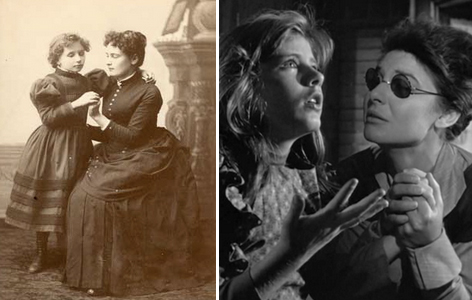
Born: Helen Adams Keller was actually born with the ability to see and hear on the day of her birth in June 27, 1880 in Tuscumbia, Alabama. It wasn't until she contracted an illness, most likely scarlet fever or meningitis, at the age of 19 months that she became both blind and deaf.
Johanna Mansfield Sullivan (she would always be known as Anne or Annie) was born April 14, 1866 in Massachusetts. After the death of her mother in 1874, Annie and her brother Jimmy were sent to an almshouse where she lived for 7 years. It was there, in 1880 (the year Helen was born) that she became blind after an untreated bacterial eye infection called trachoma.
Oscar winning performances after the jump...
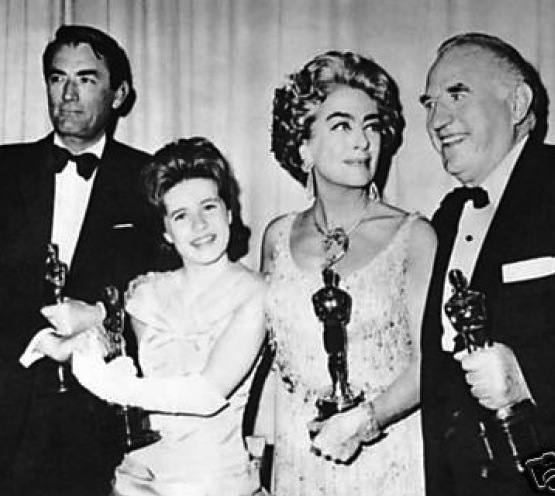 Your Oscar Quartet from '62. Wait a second? Joan Crawford (who accepted for Bancroft) shoved herself in there?
Your Oscar Quartet from '62. Wait a second? Joan Crawford (who accepted for Bancroft) shoved herself in there?
Death: The women remained life-long companions. Annie Sullivan fell into a coma and dead on October 20, 1936 while holding Helen Keller's hand. Helen, who suffered a series of strokes in 1961, spent her remaining years at home where she died in her sleep on June 1, 1968. Both of their ashes are housed next to each other at the Washington National Cathedral in DC.
Their Extraordinary Lives: Wanting to find a way to better communicate with their daughter, Helen's parents were directed to the Perkins Institute for the Blind by telephone inventor, Alexander Graham Bell. Annie Sullivan, a graduate of the school was sent to teach Helen in 1887. Helen then went on to formal education at Perkins and other schools. In 1904, she graduated from Radcliffe College and became the first deaf blind person to ever receive a Bachelor of Arts degree. She became a prolific writer and lecturer (she learned to speak by placing her fingers on the lips, nose, and throat of people and repeating their sounds). She was also a vocal advocate for people with disabilities, a suffragist, a radical socialist, and an early supporter of birth control. Helen Keller was living proof that greatness can be achieved no matter what the circumstances.
Anne Bancroft and Patty Duke The Miracle Worker (1962)
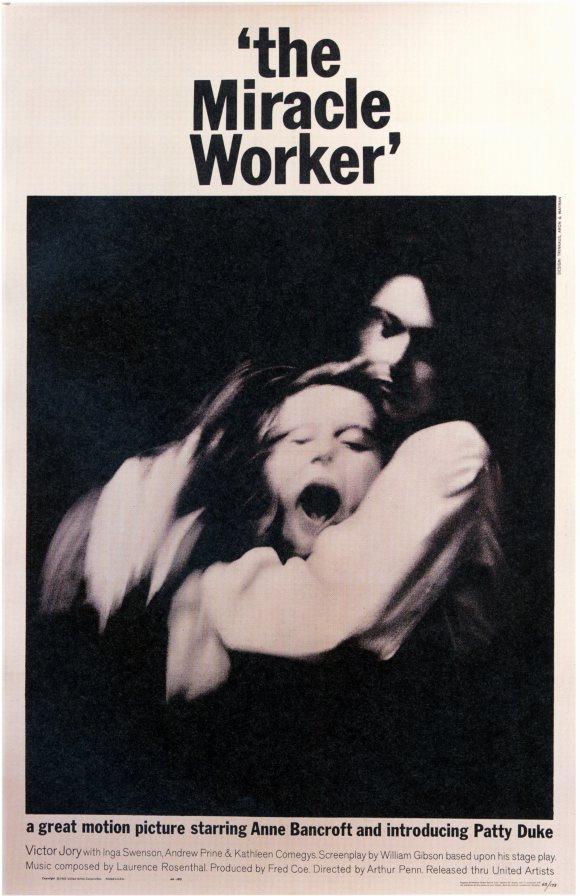 Oscar Nominations Received by the Film: Reprising their roles from the Broadway production, the film won both of its leading ladies acting Oscars: Best Actress for Bancroft and Supporting Actress for Duke. The film was also nominated for Best Director (Arthur Penn), Best Adapted Screenplay, and Best Costume Design (Black & White)
Oscar Nominations Received by the Film: Reprising their roles from the Broadway production, the film won both of its leading ladies acting Oscars: Best Actress for Bancroft and Supporting Actress for Duke. The film was also nominated for Best Director (Arthur Penn), Best Adapted Screenplay, and Best Costume Design (Black & White)
The Other Best Actress Nominees: Bette Davis What Ever Happened to Baby Jane?, Katharine Hepburn Long Day's Journey Into Night, Geraldine Page Sweet Bird of Youth, Lee Remick Days of Wine and Roses
The Other Best Supporting Actress Nominees: Mary Badham To Kill a Mockingbird, Shirley Knight Sweet Bird of Youth, Angela Landsbury The Manchurian Candidate, Thelma Ritter Birdman of Alcatraz
The film version of how deaf and blind Helen Keller began to effectively communicate thanks to the help of teacher Annie Sullivan seems like the perfect heartwarming tale for a Hallmark Hall of Fame film or a sappy after-school special. But Arthur Penn's 1962 film seems to be almost a horror story. In the first scene, Helen's mother (Inga Swenson) starts screaming bloody murder when she discovers that her baby has stopped responding to both sounds and visual stimulation. The opening credits then begin with surrealist black and white images that seem to come out of a nightmare (including a disturbing image in a Christmas ornament that shatters into a million pieces). Characters are not even able to find peace in slumber as Annie Sullivan is continuously haunted by her past and the death of her brother. And just look at that poster. Patty Duke resembles Edvard Munch's The Scream more than anything human.
The film is exhausting. Filled with a hyper energy (Victor Jory playing her father, seems to shout every single line. Helen might be deaf, but the audience isn't), the film propels the story forward through the sheer physicality of Duke and Bancroft's performances. Patty Duke throws herself into the role of Helen Keller–literally. (At 15, Duke was much older than the real-life Helen Keller was at the time and almost lost out on the part in the film. She was able to re-create her role after fellow Broadway co-star Bancroft was cast.) Playing Helen like a feral animal, Duke, her hair a tangled mess, covered in dirt, flings her entire body about with abandon. It's a fully committed performance that astonishes in its ferocity.
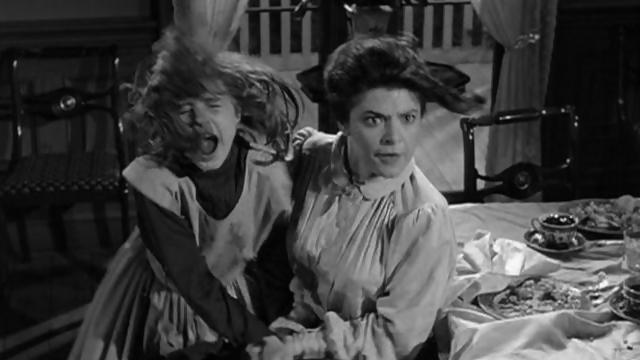
The centerpiece of the film is a throw-down, battle-of-wills fight in a dining room that is more relentless and raw in its violence than anything Quentin Tarantino could imagine. Helen, whose parents have allowed her to graze about the dinner table, shoves handfuls of food in her mouth and gobbles it up like a ravenous dog. Determined to make Helen a civilized member of society, Annie forces her to sit in a chair and eat with a real spoon. As Helen continually jumps up from the seat, she is forcibly thrown back down by Annie. The repetitive nature of it begins to resemble a Looney Tunes cartoon as Helen is unable to escape the determined grasp of her teacher–hopping up like a demented jackrabbit, only to be pulled back down firmly to earth. Like breaking in a wild horse, Helen eventually folds her napkin. A small step in her journey.
Bancroft's Annie Sullivan is out-spoken, determined, and a perfect foil to Duke's Helen. Never one to sugarcoat anything, her goal isn't to whip Helen into submission, but to unlock the power of language. She does it with grit and hard work. Bancroft's performance avoids cheap sentimentality. (Even stating that she's not even sure if she likes Helen.) Which makes Helen's breakthrough, realizing that each word that Annie teaches corresponds to an actual thing with the water from a pump, that much more emotional. We've earned this release.
Like Helen, we've awoken from the horror film:
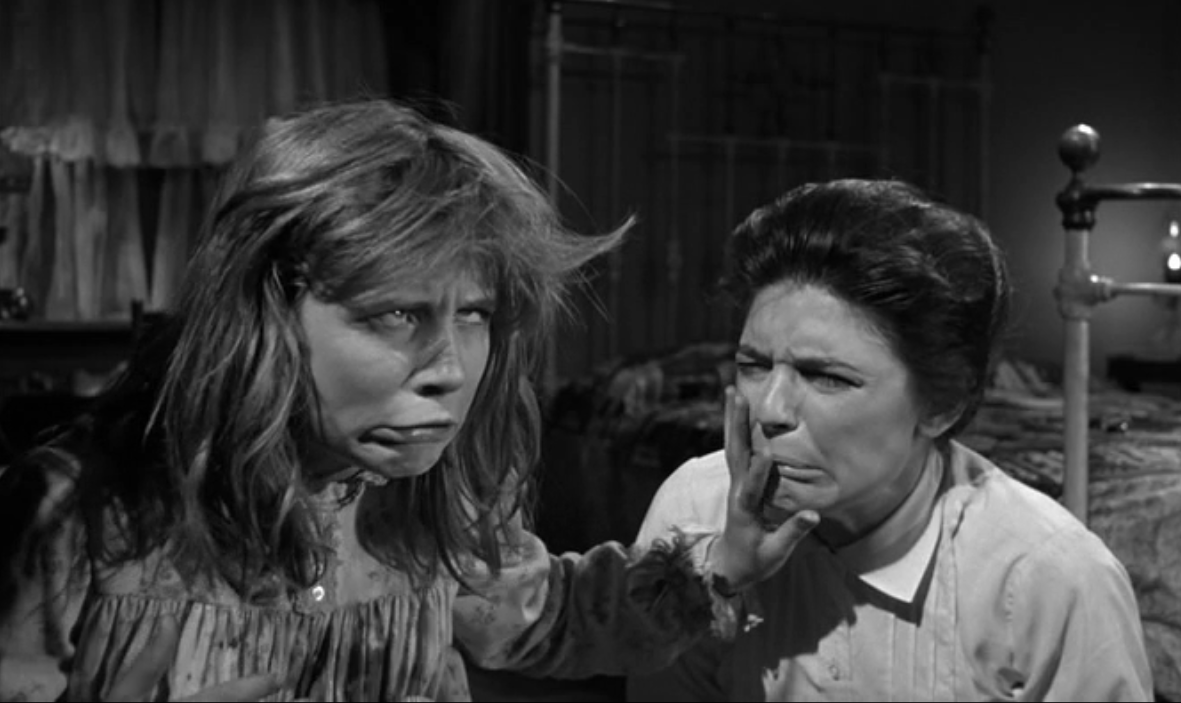
To find hope in the darkness.
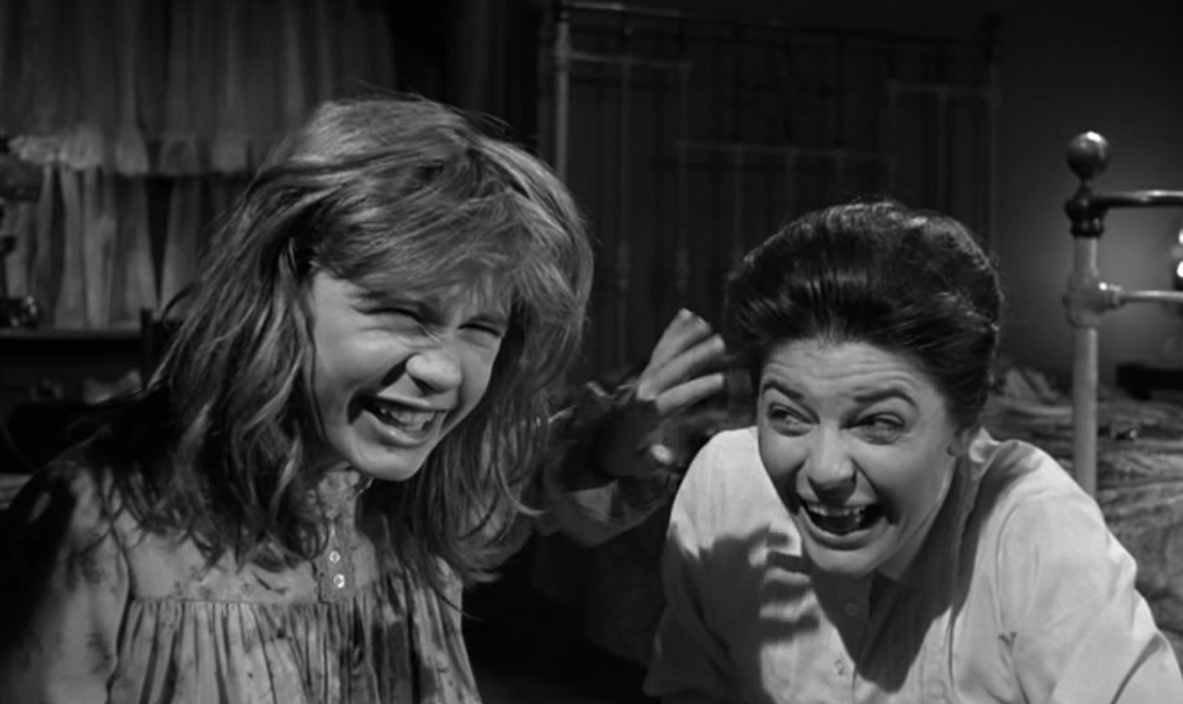
Related...
More Women's History Month
More on Oscars in the 1960s
More from Abstew



Reader Comments (23)
I was surprised at how intense the movie was when I finally saw it. Equating it with a horror story is a pretty accurate description, but as you pointed out, all that intensity and those horrors really do make Helen's breakthrough one of the most moving movie moments I've ever seen. Of course the film gets lost in shuffle of discussion between Lawrence of Arabia and To Kill a Mockingbird (not that I think it's better than either of those undisputed classics), but I think it deserves more discussion if for only how surprising it actually is. Also, as a Bama boy, shout out to '62 for having two films based in my great/flawed home state for representing at the Oscars!
a True classic movie that should be Required for all to see in grade school for education of the mind and empathy towards others less fortunate!
I first saw it when I was a kid. I remember it being as a breathtaking experience and yes, very exhausting too. Arthur Penn was a great director.
P.S. By the way, an absolutely mesmerizing Best Actress line-up.
Love this movie. It was a damn good year for Best Actress, i only havent seen Kate's performance. Lee Remick was sensational, but Bancroft's was the powerhouse performance. Honestly I would have been happy with any of the 5 winning.
I love the fact that not only did Joan Crawford not win that year, but she shoved herself into that picture and is the ONLY thing you find yourself looking at. True movie star of the highest order.
My first thought when seeing the "Oscar Winners" photo was a memory of Joan Crawford allegedly asking to accept on Bancroft's behalf as a final act of revenge against Bette Davis following the troubled Baby Jane shoot!
Is this even true?
Kermit-if I remember my Inside Oscar correctly, yes it is. Crawford sent congratulatory letters to the other four nominated women, and said if they couldn't attend she'd be glad to pick up the award for her. Bancroft couldn't make it, and so Crawford accepted on her behalf, with Davis furiously looking on, seeing Crawford accepting the Oscar she was sure would be hers.
The most exhausting thing about the otherwise wonderful Miracle Worker is unfortunately Patty Duke herself. Whether or not she gives a great performance here (and I'm not absolutely convinced that she does), she should never have been allowed to recreate her Broadway role. Anne Bancroft at almost 30 years of age can play almost 21 year old Annie Sullivan, certainly in black and white. But 14 year old Patty Duke can NOT play 6 year old Helen Keller. At least not convincingly. Sorry.
I've thought for a while now that this, rather than Bonnie & Clyde, is Arthur Penn's masterpiece. What a tremendous synthesis of performances, script and filmmaking talent. The dining room sequence is an all timer, and when Helen finally connects to the world at the end it's one of greatest cathartic moments in film history, IMO. So much joy, after so much pain.
I didn't see this one until later, but I remember seeing the Melissa Gilbert TV version (with Patty Duke as Annie Sullivan) as a kid.
Wow--the Best Supporting Actress that year was tight! I would have gone with Mary Badham for her naturalistic interpretation of Scout Finch. Although, Lansbury was pretty awesome in Manchurian Candidate. Tough call.
kermit_the_frog, I remember reading an interview with Anne Bancroft in which she said she was asked who she wanted to accept on her behalf were she to win and she responded "one of the greats, like Joan Crawford." Joan scheming to get the gig so that she could extract revenge on Davis makes for a good story, but I question its accuracy.
I think that Bancroft and Duke's performances rate among the finest to be honored with Academy Awards, even though the latter was older than her character. I long for the days when a little-known New York theater actress in a low-budget, uncommercial film could win Best Actress. Today, the Anne Bancrofts and the Shirley Booths would probably be out of luck.
Joan's look reads: "It's almost as if Blanche Hudson was the best performance this year."
(And it is seriously underrated, esp. since Bette gets all the credit.)
Mike M. -- You're right! Now Meryl would be the first choice for both roles ;)
willy - although duke was twice the age the real Helen was at the time the story takes place, it doesn't really bother me. i think she reads younger than 14 anyway. but also, it's a pretty intense role for a 7 year-old to play. i'm not sure if someone that young could handle it in quite the same way.
mike m - apparently the studio wanted elizabeth taylor to play annie - cause you gotta have a star! thank god, they realized the original actresses should be able to immortalize their roles on film.
I've never had a problem with Patty Duke's age, and I think subliminally I'm glad she wasn't a "child" in this. I figured Patty was about 12 years old and really, Hollywood has always been fluid with age, in either direction. I mean isn't Theo James still playing High School age?
The problem is not the age, the problem is the look. Dustin Hoffman was almost 30 when The Graduate was shot, but could pass for nearly a decade younger. Patty Duke in The Miracle Worker looks like a teenager and not like a child. And even if I'm very generous and assume that she looks like 12, then she still was twice as old as Helen Keller was when Annie Sullivan achieved her success which unfortunately robs the story of some of its impact. But I concede that even apart from the age question (which isn't that much of a question), Duke's performance leaves me largely cold.
The last scene of "Long Day's Journey..." is absolutely shattering, a strong case for Hepburn's most searing dramatic work. However, the climax of "The Miracle Worker" could make stones weep. It starts at the reunion dinner where Helen ominously keeps removing her napkin, triggering a regression and fight with Annie once more, driving Bancroft to roar at the Keller family, "I treat her like a seeing child because I expect her to see!" And then the whole sequence at the pump...dear God. As good as Duke is in that scene--and she's extraordinarily good (as good as Badham or Lansbury? Well....)--it's Bancroft's reactions that sell it: the incredulity, then the dawning realization, then the near-hysterical joy climaxing with her screaming "Mama! Papa! SHE KNOWS!!" And then, as Helen fumblingly reaches for Annie's hands and face, and asks a question, Bancroft slowly spells "Teacher." (I'm crying just recapping this.) It's the cumulative power of the (true!) story in tandem with those two performances that seals the deal.
Such landmark performances; take my breath away every time. Also, LOVE how Crawford squeezed her way in there! Bette Davis must have been livid.
I played the brother in a production of the stage play. It reads and plays like a horror story even more onstage. You're trapped in the confines of theatrical design and far more focus is placed on the near destruction of the family caused by the battles between Annie and Helen. When the father is played with a bit more subtlety, it becomes clear in the second act that he is the monster everyone fears in the house.
Then again, I played the show in a unit set production where every room was on a different platform anywhere from 6 inches to 8 feet above the stage with a middle school girl climbing all over the place with her eyes closed. I still don't know how she managed it. I fell more times than I care to admit stepping out of the dining room, a scant foot off the stage floor, and I was the only actor to walk off the lip of the stage during a rehearsal.
A great and powerful film with two amazing performances. They richly deserved their Oscars but fate can be so cruel since Angela Lansbury was perfection in Manchurian Candidate and all the leading actresses were equally deserving of the prize. Long Day's Journey Into Night is the only other Katharine Hepburn performance that I thought was worthy of the top prize besides her winning one in The Lion in Winter. It's also a same the criminally undervalued Lee Remick never had another crack at the Oscar, I found Days of Wine and Roses almost unbearable to watch but both leads were superlative.
I keep forgetting that The Miracle Worker missed out on a Best Picture nomination, losing out to The Longest Day, The Music Man and Brando's Mutiny on the Bounty.
Great performances all around, but I personally prefer Angela Lansbury's quiet villainy in The Manchurian Candidate.
ajnrules -- i would have voted for Angela Lansbury too. But i'd place both of these ladies in the leading category so that makes the decision easier :)
This is one of my favorite Best Actress winners. Anne Bancroft just tears me up in this part. I shudder to think that if the studio had won out and cast an established star, then the world would never have gotten Anne in The Pumpkin Eater or The Graduate. What a terrible thought that is. Thank God Arthur Penn insisted on using Bancroft so she could ignite her career with this powerful breakthrough.
I agree with everyone on this Best Actress lineup: one of the all-time greatest. Adore Davis, love Remick. Still, Anne deserved the win. Heartbreaking every single time.